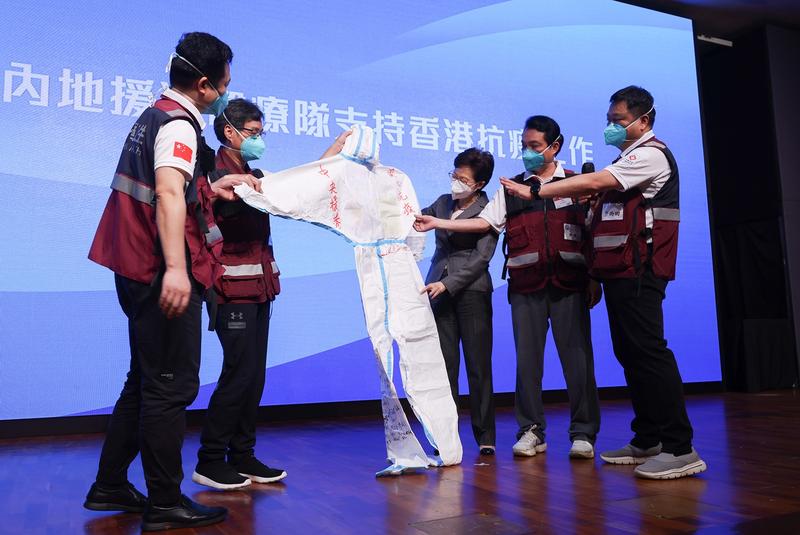 The mainland team supporting Hong Kong's fight against the epidemic presents a protective jacket with the words "One Heart Against the Epidemic" to the Hong Kong government at the Regal Airport Hotel in Hong Kong on Thursday. (CALVIN NG / CHINA DAILY)
The mainland team supporting Hong Kong's fight against the epidemic presents a protective jacket with the words "One Heart Against the Epidemic" to the Hong Kong government at the Regal Airport Hotel in Hong Kong on Thursday. (CALVIN NG / CHINA DAILY)
Hong Kong communities on Thursday said goodbye to about 400 Chinese mainland medical professionals who have worked in the city for almost two months to treat COVID-19 patients.
Officials said their timely support not only helped the city contain the worst wave of the epidemic, but also laid a solid foundation for deepening cross-border medical cooperation in the Guangdong-Hong Kong-Macao Greater Bay Area.
Addressing the farewell ceremony, Chief Executive Carrie Lam Cheng Yuet-ngor said Hong Kong's anti-epidemic fight reached its most critical juncture in March, recording over 10,000 new cases daily.
At the request of the Hong Kong government, the central government and Guangdong government arranged for 391 medical workers from 25 Guangdong hospitals to arrive in Hong Kong in three batches, working with local counterparts to take care of confirmed patients in the community treatment facility at AsiaWorld-Expo.
Over 1,200 COVID patients received treatment and were discharged from the facility. Hong Kong's epidemic situation was gradually put under control, with the number of daily infections falling to less than 500. The AsiaWorld-Expo has been placed on standby since Wednesday.
During the ceremony, Lam presented a memorial silver plate and banners to the mainland workers. They gave Lam a protective suit with the signatures of all of the team members on it, and a painting of a cotton tree and a bauhinia, the symbols of Guangdong and Hong Kong.
Lam said the mainland professionals put aside their work, left family members and friends and came to Hong Kong at the height of the epidemic to offer their help. It fully showcased their selflessness and the brotherhood among compatriots, she said.
She said that they have worked well with their Hong Kong peers, greatly enhancing the expo center's treatment capacity and promoting the integration of Chinese and Western medicine.
Henry Fan Hung-ling, chairman of the Hospital Authority, said the fifth wave of the epidemic put unprecedented pressure on public hospitals and many local medical workers had been struck down by the virus since February. The support of the mainland medical team greatly eased their burden.
Fan noted that the mainland professionals brought with them rich anti-epidemic experience, and the operation fostered greater interaction with the Hong Kong medical sector.
He hoped it could be a good start, and the medical collaboration could be furthered under the framework of the Greater Bay Area to help Hong Kong address its medical problems such as its labor shortage.
He Jing, deputy director of the central government's liaison office in Hong Kong, said that the mainland workers excellently demonstrated their professionalism and dedication in the assistance operation.
The success of the mission again proved that the motherland is always the strongest backer of Hong Kong, and the nation's unswerving support can offer great confidence for the city to overcome all kinds of difficulties, He said.
Chong Yutian, leader of the mainland medical team, said seeing groups of patients successively discharged from the facility was their greatest feedback, and that all the efforts were worth it.
He said the mainland workers were quite surprised that the chief executive held such a farewell ceremony for them, adding that it showed much recognition for their work.
He hoped both the mainland and Hong Kong can overcome the virus soon and medical workers can have more exchanges when normal cross-boundary travel is resumed.
Oasis Hu contributed to this story.


